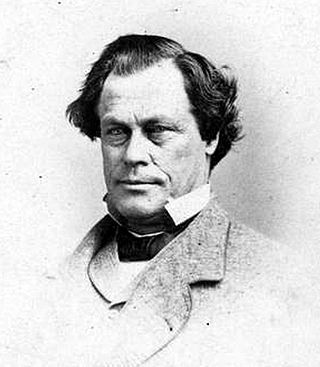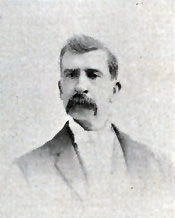Related Research Articles

Reverend Leonard Bacon was an American Congregational preacher and writer. He held the pulpit of the First Church New Haven and was later professor of church history and polity at Yale College.

Wheaton College is a private Evangelical Christian liberal arts college in Wheaton, Illinois. It was founded by evangelical abolitionists in 1860. Wheaton College was a stop on the Underground Railroad and graduated one of Illinois' first black college graduates.

Phi Alpha (ΦΑ) is a men's Literary Society founded in 1845 at Illinois College in Jacksonville, Illinois. It conducts business meetings, literary productions, and other activities in Beecher Hall, the oldest college building in Illinois.

Alexander Hamilton Bullock was an American lawyer, politician, and businessman from Massachusetts. First a Whig and then a Republican, he served three terms (1866–69) as the 26th Governor of Massachusetts. He was actively opposed to the expansion of slavery before the American Civil War, playing a major role in the New England Emigrant Aid Society, founded in 1855 to settle the Kansas Territory with abolitionists. He was for many years involved in the insurance industry in Worcester, where he also served one term as mayor.

Owen Lovejoy was an American lawyer, Congregational minister, abolitionist, and Republican congressman from Illinois. He was also a "conductor" on the Underground Railroad. After his brother Elijah Lovejoy was murdered in November 1837 by pro-slavery forces, Owen, a friend of Abraham Lincoln, became a leader of abolitionists in Illinois, condemning slavery and assisting runaway slaves in escaping to freedom.

Jonathan Blanchard was an American pastor, educator, social reformer, and abolitionist. Born in Vermont, Blanchard attended Middlebury College before accepting a teaching position in New York. In 1834, he left to study at Andover Theological Seminary, but departed in 1836 after the college rejected agents from the American Anti-Slavery Society. Blanchard joined the group as one of Theodore Dwight Weld's "seventy" and preached in favor of abolition in southern Pennsylvania.

Richard Wellington Townshend was a lawyer and U.S. Representative from Illinois.

Jethro Ayers Hatch was an American physician and politician who served one term as a U.S. Representative from Indiana from 1895 to 1897.
David Edward Maas is Emeritus Professor of History at Wheaton College (Illinois), United States. He was first appointed to Wheaton's faculty in 1970 and retired in 2010.
Charles Augustus Hilton was a Union soldier in the American Civil War and later became a Free Will Baptist preacher. Hilton, New York, a village in the town of Parma, was named after him in 1896. He was born on July 22, 1845, in Parsonsfield, Maine, the son of George and Abigail F (Ricker) Hilton, and died in Minneapolis, MN on October 24, 1912. He was married on April 21, 1872, in Frankfort, Illinois, to Sarah Adelaide Carpenter, the daughter of Josiah and Frances (Haradon) Carpenter. She was born on January 21, 1853, in Frankfort, Illinois, and died in Minneapolis, Minnesota, on October 8, 1944.
College Church is an evangelical nondenominational church in the broadly Reformed tradition located in Wheaton, Illinois. It was founded in 1861 by Jonathan Blanchard, who was also the first president of Wheaton College, an unaffiliated university. College Church is located across two city blocks facing the Wheaton College campus; however, Wheaton College is not formally tied to College Church. Josh Moody has been the Senior Pastor of College Church since 2009. It reported regular membership of 1,290 in 2022.

Michael Kelly Lawler was a volunteer militia soldier in the Black Hawk War 1831–1832, an officer in the United States Army in both the Mexican–American War and the American Civil War. In the latter conflict, as a brigadier general he commanded a brigade of infantry in the Western Theater and served in several battles.

Elbridge Boyden (1810–1898) was a prominent 19th-century American architect from Worcester, Massachusetts, who designed numerous civil and public buildings throughout New England and other parts of the United States. Perhaps his best known works are the Taunton State Hospital (1851) and Mechanics Hall (1855) in Worcester.

Augustus Brown Reed Sprague was an American businessman, politician, and military figure who served as the mayor of Worcester, Massachusetts, the sheriff of Worcester County, Massachusetts, and as a Union Army officer during the American Civil War.
Wilder Smith was an American minister and author.

David Rowlands was a Welsh Congregational minister, college head and poet.

Juanita Breckenridge Bates was an American Congregationalist minister, her application being the test case to determine the policy of the denomination. She was the first woman to be awarded a Bachelor of Divinity degree from Oberlin College (1891), and Oberlin was the first school to award this degree. For decades, she was a community organizer in the women's suffrage movement.

Samuel Harrison was a black American abolitionist, former slave, preacher, and Army chaplain who operated largely in and around New England. He was a staunch writer and orator against slavery and racism, eventually convincing President Abraham Lincoln to enact equal pay for black chaplains.

Samuel Richardson Heywood (1821-1913) was an American businessman, and founder of the Heywood Boot & Shoe Company in Worcester, Massachusetts.
John P. Brennan was the first American Catholic priest to declare bankruptcy.